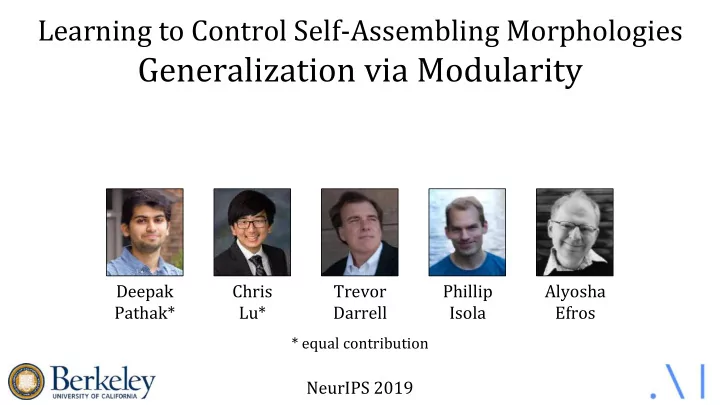

Learning to Control Self-Assembling Morphologies Generalization via Modularity Deepak Chris Trevor Phillip Alyosha Pathak* Lu* Darrell Isola Efros * equal contribution NeurIPS 2019
How do we train a robot?
Multiple tasks � � Expert demonstrations Rewards, labels � … �
Self-supervision Multiple tasks � � � Curious exploration � Expert demonstrations Learning “common sense” Rewards, labels � � … … � �
. . .
. . . … even earlier?
Single to Multicellular
Single to Multicellular competition � collaboration
Single to Multicellular competition � collaboration shared objective
Compositionality has been useful in language … [Andreas et. al. 2016]
How to implement compositionality in hardware?
Modular Co-evolution of Control and Morphology
Modular Co-evolution of Control and Morphology Cylindrical Limb
Modular Co-evolution of Control and Morphology Cylindrical Limb Configurable Motor Joint
Modular Co-evolution of Control and Morphology
Modular Co-evolution of Control and Morphology
Modular Co-evolution of Control and Morphology Potential Magnetic Joint
Modular Co-evolution of Control and Morphology Potential Magnetic Joint
Modular Co-evolution of Control and Morphology Acts as single agent upon joining Rewards are shared! Potential Magnetic Joint
Modular Co-evolution of Control and Morphology Acts as single agent upon joining Rewards are shared! � Input = Local Sensory State � Output = Torques, Link, Unlink Potential Magnetic Joint
Modular Co-evolution of Control and Morphology Acts as single agent upon joining Rewards are shared! � Input = Local Sensory State � Output = Torques, Link, Unlink Potential Magnetic Joint
Consider the task of “standing up” …
How to learn compositional controllers?
Idea: Shared policy network across limbs Node Node Node Node Nod Node Node in Node Node Node Node Node Node
Idea: Shared policy network across limbs output Node Node shared Node Node Nod Node Node policy in 𝜌 𝜄 Node Node Node Node Node Node input
How to adapt when morphology changes?
How to adapt when morphology changes?
Network as reusable LEGO Blocks
Network as reusable LEGO Blocks output shared policy 𝜌 𝜄 input
Network as reusable LEGO Blocks message output output shared policy 𝜌 𝜄 input message input
Network as reusable LEGO Blocks message output output shared same policy dimension 𝜌 𝜄 input message input
Network as reusable LEGO Blocks message output output shared policy 𝜌 𝜄 input message input
Network as reusable LEGO Blocks message output output shared policy 𝜌 𝜄 input message input
Network as reusable LEGO Blocks 𝜌 𝜄 𝜌 𝜄 message output output 𝜌 𝜄 shared policy 𝜌 𝜄 input message input
Network as reusable LEGO Blocks 𝜌 𝜄 𝜌 𝜄 message output output 𝜌 𝜄 shared policy 𝜌 𝜄 input message input
Network as reusable LEGO Blocks 𝜌 𝜄 𝜌 𝜄 message output output 𝜌 𝜄 shared policy 𝜌 𝜄 input message input
Network as reusable LEGO Blocks 𝜌 𝜄 𝜌 𝜄 message output output 𝜌 𝜄 shared policy cut 𝜌 𝜄 input message input
Network as reusable LEGO Blocks 𝜌 𝜄 𝜌 𝜄 message output output 𝜌 𝜄 shared policy cut and paste 𝜌 𝜄 𝜌 𝜄 input message input 𝜌 𝜄 𝜌 𝜄
Network as reusable LEGO Blocks 𝜌 𝜄 𝜌 𝜄 message output output 𝜌 𝜄 shared adaptation by policy cut and paste conditioning 𝜌 𝜄 𝜌 𝜄 input message input 𝜌 𝜄 𝜌 𝜄
Dynamic Graph Networks
BTW, basically curriculum learning but in hardware
How well does it generalize?
. . .
. . . a bit crazy… is it even possible in real world?
Self-Assembling Robots in the Real World [Mark Yim’s Lab at UPenn] [Daniela Rus's Lab at MIT] Also: [Modular Snake Robot – Howie Choset’s Lab at CMU]
code & data at https://people.eecs.berkeley.edu/~pathak/ Poster # 197 Today (Tues)!! Thank You!
Recommend
More recommend